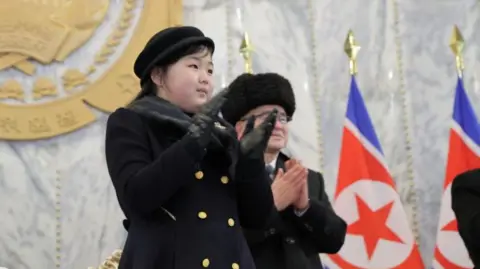Kim Jong Un's arrival in China for his first multilateral meeting created headlines, but it was his daughter Kim Ju Ae, who drew significant attention as she stood neatly dressed behind him upon exiting his armored train. According to South Korea's National Intelligence Service, Kim Ju Ae is perceived as her father’s most probable successor.
Details about her, however, are sparse, including her exact age. What do we know about this figure poised to inherit North Korea’s legacy?
Kim Ju Ae is believed to be the second child of Kim Jong Un and his wife, Ri Sol-Ju. While rumors regarding their children linger, Kim Ju Ae’s existence was confirmed when basketball player Dennis Rodman mentioned holding her during a visit to North Korea in 2013. Her public visibility increased dramatically starting November 2022, when she appeared beside her father during a missile launch.
By early 2023, Kim Ju Ae was featured on postage stamps and described as 'respected,' a title usually reserved for North Korea's most revered leaders. Observers noted her access to events previously confined to high-ranking officials, further bolstering speculation about her importance within the regime.
She has been educated at home in Pyongyang and is said to enjoy activities such as horse riding, skiing, and swimming. Analysts have estimated her age to be around 10, and recent assessments have increasingly suggested that she is the most qualified potential successor to Kim Jong Un, although many uncertainties remain.
Most notably, her recent trip to Beijing marks her first venture out of North Korea alongside her father, possibly indicating an effort to normalize her public presence and assert her importance in the succession narrative. Given North Korea's deeply engrained patriarchy, it is intriguing how Kim's regime might adapt to introduce a female leader amidst traditional biases.
As discussions of Kim Ju Ae’s future take shape, the dynamics of North Korean leadership remain fluid. The Kim family's historic rule relies on notions of dynastic succession, reinforcing an ongoing narrative of scarcity and loyalty that permeates the nation's political fabric.


















